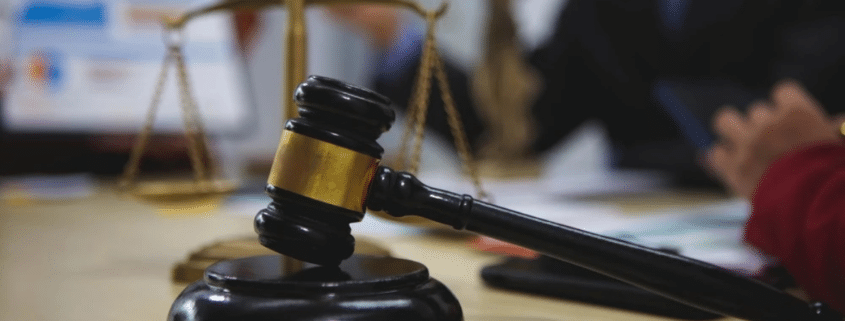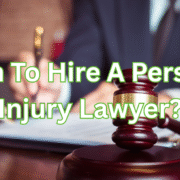How to Choose a Personal Injury Lawyer
A crash, a fall, or a dog bite can erode your savings and disturb your sleep. Doctor’s appointments cut into time on the job, bills arrive daily, and the insurance adjuster demands a quick signature. In this confusing situation, the personal injury lawyer you pick can change the story.
A good advocate shields your rights, finds every penny of value in your claim, and lets you focus on healing. This article shows Utah readers how to sort strong lawyers from weak ones, why timing is urgent, and what questions lift the fog when you first sit down across the desk.
Use it as a roadmap to fair treatment and a calmer mind when life turns upside down.
Why Hiring the Right Injury Lawyer Matters Nowadays
Modern claims move fast, and insurers use data and rules you may never have heard of. The right attorney even fights that fight.
Here are some clear reasons selection still matters in 2025:
- Bigger recoveries: Studies find that represented claimants usually secure higher payments than people who handle cases alone, even after fees are deducted.
- Less paperwork stress: Lawyers manage forms, deadlines, and medical record requests so clients can rest.
- Serious leverage: Insurers recognize firms that try cases and raise offers to avoid court.
- Bill control: Counsel can often delay or reduce hospital collections until the case closes.
- Rule mastery: Utah’s four-year filing deadline and comparative fault law can shrink or enlarge awards; good counsel keeps the clock in check.
- Access to experts: Accident-reconstruction specialists and physicians add weight to claims that the carrier may doubt.
In other words, the right partner can be the difference between speedier relief, bigger checks, and fewer sleepless nights.
10 Tips for Hiring the Best Personal Injury Lawyer in Utah
Follow these steps, and you can screen any company before you sign an agreement to pay a fee. If a lawyer seems to wince at obvious answers or rush you through your meeting, keep shopping.
Confirm State License and Discipline Record
Start at the Utah State Bar’s online directory. Enter the personal injury lawyer’s name and look for a clean record, no suspensions, reprimands, or unpaid judgments. A spotless history signals respect for ethics and clients. While a single minor infraction years ago may not spell trouble, repeated discipline can reveal deeper issues. Ask about any entry you see and gauge the candor of the explanation. A lawyer who owns mistakes and shows improvement may still be a fine advocate, but one who dodges questions is a red flag. Five minutes of online research can spare years of regret.
Look for a Meaningful Trial Experience
Most claims settle, yet insurance carriers track which attorneys back words with action. Check with the lawyer to learn how many jury verdicts he has achieved in injury cases in the past five years, and ask for docket numbers you can verify. Trial familiarity forces adjusters to value cases at court levels instead of discount levels. It also prepares your team if talks stall. Even if you hope never to see a jury, having a lawyer who speaks that language keeps negotiations honest and raises settlement potential.
Measure Net Results: What Do Clients Take Home?
High-headline verdicts can mislead because fees, costs, and medical liens come off the top. Instead of asking, “What’s your biggest case?” ask, “What did your last three clients with injuries like mine clear after every deduction?” A truthful lawyer should share ballpark figures and explain how costs are tracked. Honest discussion of liens, Medicare reimbursements, and tax impact shows the firm respects your bottom line, not just theirs.
Costs and Contingency Fees
A Utah injury attorney will normally take a third of the recovery; however, if a trial is necessary, the fee may increase. In the agreement, make sure it says when the percentage goes up, when costs are taken off the top or bottom, and whether and under what circumstances costs incurred will be charged if you terminate the case. Request a sample settlement sheet so you can see real math. Clear numbers now prevent hard feelings later.
Evaluate Communication Style and Availability
On the consultation, simply notice if the lawyer listens as opposed to interrupting, answers in ordinary language as opposed to legal jargon, and gives a rough timeline of the stages of a case. You should inquire as to the frequency of updates and whether you will be able to reach the attorney or a paralegal. You will be more likely to cooperate with someone who has a style similar to yours; comfort fuels trust.
Know Who Will Handle Daily Work
Large firms may market with a name partner but pass files to junior associates. Ask to meet the actual team (associate, paralegal, and case manager) who will build your claim. Request each person’s role and experience level. A well-organized crew often assigns investigation, medical record ordering, and client contact to set members so nothing slips. When you know faces and duties, you’ll know where to turn for quick questions and avoid feeling like a case number.
Check Resources and Expert Access
Complex claims sometimes hinge on biomechanical engineers or life-care planners whose reports can run thousands of dollars. Ask whether the firm fronts these expenses and under what circumstances you may owe repayment. Well-funded offices can hire top experts without blinking; shoestring operations may pressure you to settle early to avoid rising costs. Adequate resources show confidence and commitment.
Favor Local Knowledge and Community Roots
A personal injury lawyer who practices in Utah courts daily knows judges’ scheduling habits, common jury attitudes, and local medical billing norms. They can also recommend nearby therapists or specialists who treat on liens. Out-of-state counsel may need weeks to learn the same terrain. Proximity also means you can visit the office for paperwork or updates without a long drive.
Review Past Settlements for Similar Injuries
If you suffered a herniated disc or a broken wrist, ask the lawyer to describe at least two recent cases with those injuries and the settlement range obtained. Similar-fact examples prove familiarity and help set realistic expectations. Remember, every claim is unique (age, prior health, and liability facts all matter), but comparative data beats blind guesswork.
Trust Your Instinct and Personal Comfort
After facts and figures, pause and weigh how you feel. Did the lawyer treat you with respect? Did the explanations make sense? Stress may cloud judgment, yet a nagging doubt on day one often grows louder as the months roll on. Select a counselor you would feel good calling at night if a medical setback arises. Peace of mind is worth as much as any courtroom skill.
Why Choose Cockayne Law as Your Trusted Agency in Utah
Cockayne Law blends relentless advocacy with hometown service. Clients meet directly with lead attorney Chris Cockayne, whose trial record commands respect from major insurers. The firm’s team gathers evidence fast, keeps you updated, and advances all costs until recovery. With deep Utah ties, they know local courts, doctors, and experts who strengthen a claim. They speak plainly, return calls the same day, and guide medical liens so bills don’t wreck credit. It’s a straight approach aimed at fair money and faster relief, qualities every injured neighbor deserves.
Final Thoughts
There are deadlines for the litigation process that cannot be postponed, and if you make an error early, you could have to pay back less than you are entitled to. Assess your injury severity by self-evaluation. How complex is the fault? If answers seem complicated, call a lawyer now. Check records, ask about trial wins, and study fee sheets before you sign. When you find an advocate who knows Utah law, explains the road ahead in plain speech, and values your time, you will feel the weight lift. Whether you team up with Cockayne Law or another proven office, act soon, stay involved, and keep copies of every record. Careful choices today can pay for bright tomorrows.
FAQs
How to select the right personal injury lawyer?
Check the attorney’s Utah license, search for current courtroom work, review net client outcomes and verify that you will not be left holding the phone when it comes to your case.
What percentage do most personal injury lawyers take?
Across many states, the standard contingency fee falls between 33% and 40% of the recovery. Some firms use a sliding scale that rises if a case moves to trial or appeal.
How hard is it to win a personal injury lawsuit?
Winning depends on proving someone else’s fault and linking that fault to your damages. Clear photos, prompt medical care, and reliable witnesses help. With solid evidence and a determined attorney, most Utah cases settle before trial.
Who gets paid first in a personal injury settlement?
Typically, medical liens and case costs are reimbursed first. Your lawyer then receives the agreed contingency fee, and you receive the remaining balance via check or direct deposit.
What is a reasonable settlement offer?
A fair offer pays present medical bills, anticipated future care, lost income, property damage, and a sum for pain and life changes. Compare the figure with verdicts for similar injuries and consult your attorney before accepting.
What is a fair personal injury settlement?
Fairness means you leave debt-free, with money for ongoing treatment and recognition of emotional strain. An experienced lawyer will adjust the demand to match proven economic losses and the impact on your daily routine.

















